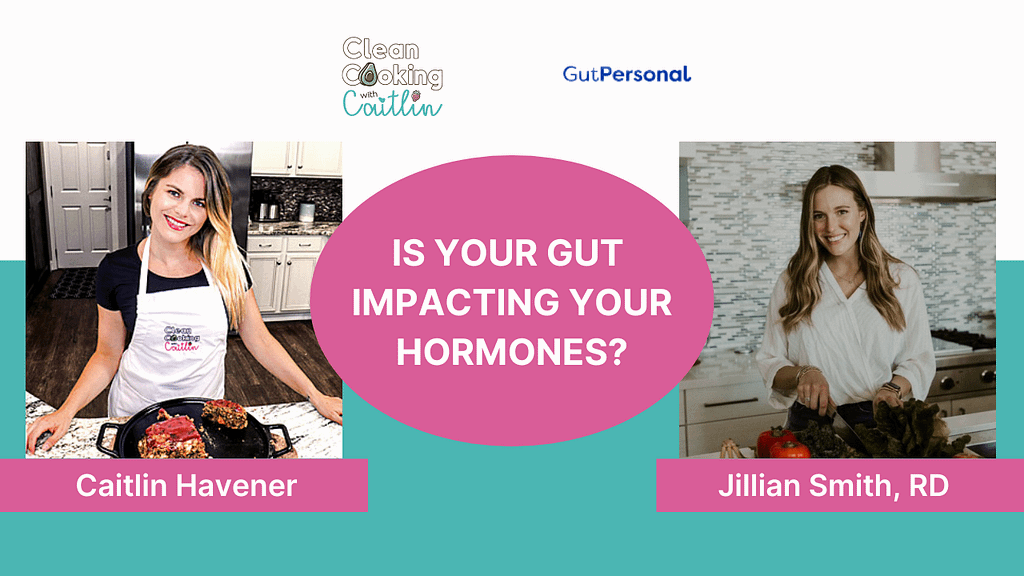Is your gut impacting your hormones? And what is the link between gut health and hormones? Today I had the pleasure of chatting with Jillian Smith, gut health nutrition expert and lead dietitian at GutPersonal, a revolutionary science-backed gut health supplement company offering high-quality products carefully designed, developed, and tested by real dietitians to produce results!
Here is her take on the link between gut health, hormones, and fertility, as well as some easy-to-implement lifestyle and dietary changes that can help fix our gut and allow us to live a more balanced life! 🌺
Jillian, can you tell me a little more about you and Gut Personal?

My name is Jillian. I am the lead registered dietitian at Gut Personal, a functional medicine practice and a personalized supplement company. I do comprehensive functional lab testing including gut testing, hormone testing, and nutrient level testing to get down to the root causes of my clients’ imbalances and symptoms. In addition, I work with women both privately and one-on-one. I also conduct our most popular group program called the Gut Fix. Lastly, I do a lot of one-off testing to get to those root cause answers.
I want to touch on a topic that has been very emotional for me. I’ve been trying to get pregnant for almost 2 years and I had a miscarriage a year ago. I’ve heard that many people are struggling with the same issues these days. Do you think the gut microbiome influences fertility for both men and women?
Yeah, there’s a huge, huge, huge impact. And you know, it’s staggering the rates of miscarriage and infertility that women are experiencing. According to one study, one in four women have a miscarriage. And so you have to start thinking about the reasons behind these concerning numbers. Why are we having these issues and these problems with infertility? More and more people are struggling with “mysterious” health symptoms, and that could look like infertility. It could also look like autoimmune conditions, hormone imbalances, deep fatigue, or digestive problems.
When a patient experiences this kind of symptoms, the 1st place I’m always thinking about is the gut. And that sometimes surprises them. Most people think that if they are having a hard time getting pregnant, it should have to be something with their hormones. I would argue that we have to take it one step further and consider if it is an issue with their gut health. The gut is known as the center of all health. It influences every system in our body, including our hormones.
And so we have to uncover things like: what are their hormones responding to you? Are they responding to something in the environment? Are they responding to imbalances in the gut? Our gut health is where we are digesting our foods. We’re absorbing our nutrients.
Even if you have the most perfect textbook diet and you’re eating all the right foods, if you are not properly digesting those foods, you’re not even able to unlock the nutrients from those healthy foods that you’re eating. So we could be dealing with some underlying nutrient deficiencies or with some underlying inflammation. These could be coming from bad bacteria or pathogens that could be harbored in the gut. Or, alternatively, just a lack of that beneficial gut bacteria. That inflammation will impact our hormones.
Our physiology as females is all centered around feelings of safety. Because our bodies are not going to procreate if it doesn’t feel safe. If there’s some imbalance, if there’s some inflammation going on on the inside, our bodies are going to be like, “Hey, we need to get this addressed before we start creating more life”. That’s kind of how women’s physiology works.
So I do a lot of gut testing in my practice so we can dive deeper into it. Why are some of these imbalances going on? Is it due to nutrient deficiencies? Is it due to underlying inflammation? When we can start kind of dialing down those root causes then we can start moving the needle.
I think I will have to undergo your intestinal test because I have taken plenty of antibiotics in the past and I have heard that this can cause leaky gut. Also, I share your point about not feeling safe. There is a lot of stress in my life, so I think my problems may also depend on that.
The work I do with a lot of clients is like peeling back the layers of an onion. The testing is super important and very valuable to asses what are we working with. But we also can’t forget about things like our nervous system and our lifestyle.
Nutrition is a really big one. Maybe we don’t even realize that we’re not properly fueling our body, or we’re inadvertently under-eating. Or maybe it’s the opposite. We’re bringing in too many excess empty calories and this is just creating more disruption in the body. When I work with clients, I’m diving into all of this because of course it’s impacting your gut health and it can be impacting fertility journeys as well.
What role do prebiotics, probiotics, and other supplements and gut personals range play in enhancing fertility?
Let’s start with the difference between a prebiotic and a probiotic. Probiotics, are going to be the live beneficial bacteria that you’re bringing inside of your gut. You can get this directly through supplements or foods like fermented yogurts, kimchi, sauerkraut, and miso. When you consume them, you’re bringing them into the environment of the gut.
On the other hand, prebiotics are the food for those probiotics. The prebiotics are going to be the things that help those probiotics thrive and survive. I like to use the analogy of the fish tank. Think of your gut as a fish tank. You’re putting some fish in there, which are the probiotics, but then you need to feed those fish so that they stay alive, that’s your prebiotic. So I recommend taking both prebiotics and probiotics to support a well-balanced, healthy, and functioning digestive system.
A big root cause of struggling with fertility is the lack of beneficial gut bacteria. These play so many different roles in our bodies. You hear about the importance of a healthy gut and making sure that your gut is healthy so that you can be healthy and thriving. It’s that beneficial gut bacteria that’s running the show on all of that. It’s that beneficial gut bacteria that play a huge role in regulating our hormones. Often we’re deficient in those bacteria because of our diet or lifestyle. Or because we have taken too many antibiotics, or because of excess stress, which can grind down on our gut health and deplete the beneficial gut bacteria.
Then we want to make sure that we’re replenishing that system and we’re doing it consistently so that bacteria can continue to grow and thrive. That’s where I like to bring in some supplemental probiotic and prebiotic support. One of the biggest things that I always caution with probiotics is that they are all created differently and different probiotics are good for different reasons. Going to any old drugstore and pulling the first probiotic that you see off of the shelf can sometimes make digestive symptoms worse.
Personalization is really important when it comes to our health in general, and especially to our gut health. That’s why we’re called Gut Personal. We’re a company that’s been built by functional medicine dietitians, like myself, who understand the importance of personalization. We weave that into our supplement recommendations and we have a full line of probiotics so that we can make sure that you’re taking the right kind for you and that’s how you’re going to be getting the most bang for your buck.
Are there some cases where a healthy diet will not fill that gap where you’ll still need the pre- and probiotic despite eating everything right?

Yeah, absolutely. There’s this theory called evolutionary mismatch. It says that our environment is increasing at a pace faster than our biology can keep up with. We’re going through immense changes with our diet and our agriculture, how we’re producing our foods, what we’re putting into our foods. And then you’re layering that on top of our modern lifestyle, which is very rooted in high stress, in the hustle culture, in the value placed on extreme productivity. And when you kind of mix all of these things together, it can be hard on the body.
Therefore, even if you have the most perfect textbook diet, you could still be lacking a lot of key nutrients and you could be plowing through your nutrients quicker than you can replenish them via food. I believe that supplements are not supplemental nowadays because our bodies are plowing through these nutrients and, in turn, these nutrients are in lesser amounts in our foods due to this modern agriculture kind of depleting our soils of those essential minerals. I do believe that even if you have a very healthy diet, which is the foundation we all need to, you know, make sure that we’re properly fueling our bodies.
But adding a little cherry on top in the form of supplemental support via probiotics or multivitamins or key nutrients that maybe you need more of due to your lifestyle, diet, circumstances, symptoms, whatever they may be, can be a big help in covering up some of those gaps. It’s almost like you need to eat completely organic and live in a bubble these days. So hard and it can feel super overwhelming sometimes.
What I always try to bring my clients back to is your body is so resilient. Even if you’ve been struggling with infertility, gut issues, or hormone imbalances for a long time, our bodies are screwed together to be resilient. Sometimes all it needs is just that added little bit of TLC and support to kind of help it gets over the hump and it can self-regulate again.
How can you personalize your products to support individuals with fertility challenges?
There are a couple of different ways. The most supportive way is of course working with our team of dietitians. I’ll speak for myself since I’m the lead dietitian over there. I work with a lot of women and when you work with me, we do a lot of in-depth testing.
Of course, I’m going to start with the gut. I’m going to do some intense, comprehensive gut testing. First is a poop test, you can get a lot of insights from it.
Then I’ll move into some hormone testing. I want to see what your body is producing in terms of hormones, how it’s regulating those hormones, and how it’s metabolizing them. We want to make sure, you know we’re kind of crossing our TS, dotting our eyes on all of that.
Then I’m also doing an in-depth nutrition assessment. We’re, you know, walking through a day of eating, When do you eat the meal? Timing is important. What you’re eating is important. How you’re eating is very important. We’re talking about lifestyle, stress, sleep. All of that plays a big role. That’s the most, supportive and the most personalized way that you can get those supplement recommendations. Through all these different things I can glean some different clues and understand what exactly you need.
Now, some people don’t want to work with a practitioner one-on-one or don’t have the time, money, or energy to do that. That’s why we created our free quiz. It takes less than 5 minutes to complete. The quiz is the sort of questions that we’re asking in our private sessions with clients, but it’s open to a much broader pool of people. You can go on there, take the quiz, and by answering the different questions we can dial in exactly what your body uniquely needs to address those root causes. That’s why I usually recommend people start with the quiz and if they want more support and more testing, then working with our team would be a great next step.
Another interesting thing is even if you’re not having apparent gut issues, like gas or bloating, you might still be having issues with your gut. And I love that you brought that up because gut issues don’t have to just look like overt digestive issues. Besides the most obvious symptoms like bloating, gas, constipation, diarrhea, heartburn, and nausea, there is also a whole range of other symptoms to consider. Among these are skin issues like acne, eczema, rosacea, and psoriasis, or immune dysfunctions like Hashimoto’s, celiac disease, or rheumatoid arthritis. It can also look like being tired all the time, struggling with fatigue, and having low energy levels throughout the day can look like hormonal imbalances.
The gut is the center of all health and it has its hands in every single system in the body. So when it comes to any sort of symptom that you’re struggling with, if you just feel off, or you just don’t feel like yourself, always recommend starting with the gut, because it’s all rooted. All comes back to our gut health.
That’s interesting because I took the quiz. I don’t have a whole lot of apparent gut issues, but I get some fatigue. And I had acne, like, really bad acne up until a few years ago, which is pretty curious. I could never solve it, and I even took Accutane as a teenager, which I’m sure is bad for the body.
I did too, I struggled with a lot of acne and coincidentally I was also struggling with a lot of gut issues at the time. This was back in high school and college. I didn’t realize that the two were connected, so I was going to the gastroenterologist for my gut issues. They couldn’t figure it out by going to the dermatologist for my skin issues. They just put me on Accutane and birth control. Nothing was fixing it until I healed my gut. Doing the gut testing and taking that holistic root cause approach. Then I was able to heal up my skin as well as my gut issues. I always say your skin is just a window to what’s going on on the inside. You are what you eat. And you are what you absorb as well. And some things you don’t even know you’re absorbing.
Are there a lot of pollutants in the air or in products that are affecting our gut as well?
Absolutely, and that kind of goes back to that theory of the environmental mismatch. You rewind 2-3, maybe 4 decades ago, there were not the same ingredients that you’re finding, not even just in our food, but in our products and in our environments and especially with women. Think about all of the products that we use every single day. We have our 20-step skincare routine and then all the powders, lotions, and potions we put all over our bodies. And the list goes on and on and on. When you’re putting something on your skin, which is your body’s largest organ, it is going inside your body as well. Your skin absorbs it.
This was also something that I didn’t even realize until post-college and I was well into my dietitian career. I didn’t even realize that all of these things that I was putting on my skin, the candles I was lighting in my house, or the laundry detergent I was using to wash my bed sheets, were impacting my physical body, as well as my hormones and fertility. And so it can be enlightening to kind of start just thinking about that.
I always tell clients, don’t feel overwhelmed by it. Don’t feel like you need to go turn over your entire house and replace everything. But maybe if you know you are ready to get a restock on laundry detergent because you ran out, you can do a quick Google search for a more natural, cleaner alternative. They’re so readily available nowadays. There are a lot of great brands and products that are making a shift in the industry and they’re easy to find. You can get them on Amazon, at Target, or in any drugstore. I do recommend making some shifts when you’re able. Sometimes it’s easier just to start small, and make simple little changes when you can.
Beyond supplements, what lifestyle or dietary changes do you recommend to someone looking to improve fertility through better gut health?

Supplements are the cherry on top. But we can’t forget about the foundations and those foundations are going to be our nutrition and our lifestyle. Starting with nutrition, something really important is to eat balanced meals. When I talk about balanced meals you want to make sure all of your meals have a good source of protein, a good source of carbohydrates, a good source of healthy fats, and some fiber, like colorful vegetables. In addition, I see a lot of women inadvertently under-eating protein. That’s probably the biggest nutrient that I see lacking and it’s super important, especially for our hormones and fertility. So make sure that you’re getting plenty of protein.
I like to make sure my clients are getting at least 30 grams of protein with every single meal and not skipping breakfast. That’s another really big one that I see is, you know, intermittent fasting being all the crave. But when we’re talking about fertility, I do not want my clients skipping breakfast. And it all goes back to creating feelings of safety in the body. If you are intermittent fasting, this is a stressor on the body. I’m not saying that intermittent fasting is good or bad. But I do think for fertility it’s not something that I recommend just because if you’re putting excess stressors on the body through fasting, that’s going to reduce your body’s feelings of safety and it can impact fertility for sure. So a protein-rich breakfast within the first hour or hour and a half of waking up is something that I recommend.
I also recommend my clients to eat plenty of good, healthy fats. Lots of nuts and seeds, avocados, avocado oil, and extra virgin olive oil. All of them are very important for hormone production as well.
In addition, we have to make sure that we’re getting good, restful sleep at night. Make sure that you are limiting exposure to electronics, and blue lights in your eyes before you go to bed, which are going to mess with your circadian rhythm, and try to go to bed around the same time each night, and wake up at around the same time each morning. Your body likes rhythms, so the more that you can kind of stick to a routine, the better your body’s going to be feeling.
As far as stress is concerned, we could probably sit here all day long talking about it. All of our bodies are under too much stress. That could be psychological stress, like having too much on your plate, feeling overwhelmed at work, or going through a global pandemic. But it can also be emotional stressors. It could be physical stressors like gut imbalances. If you’re harboring a pathogen in there, it could be dietary stressors like not eating enough. All those things go when it comes to stress. So weaving in some good nervous system regulation practices, like yoga, meditation, or low-impact exercise might be incredibly helpful. The important thing is to find something that you can do every day.
Last but not least is exercise. I am not a huge fan of a lot of high-intensity, interval training workouts, like CrossFit and boot camps, when you’re going through a fertility journey, especially if you’re having a hard time with fertility. It all circles back to letting your body feel safe, and exercise could be a huge stressor for the body. We have to think about how can we make our bodies feel safe and how can we be more nurturing. Can you weave in some more low-impact exercise? Or can you go on a long walk a couple of days of the week instead of doing a high-intensity style workout? Can you even some Pilates or yoga to bring nourishment to your body? Even things like making sure that you’re properly recovering after your workouts, if you’re working out hard, you got to recover harder.
Do you think you have anything else that you’d like to touch on regarding gut health and fertility?

If you are feeling off in your body, if you’re experiencing symptoms or having troubles with fertility or digestive issues, seek support because it can feel very debilitating and overwhelming. I know our first approach is to always hop on the “doctor Google” and start researching our symptoms. And that can just be like going down a rabbit hole, first of all, because Google does not know you. It doesn’t know your personal history, it doesn’t know your symptoms and it doesn’t know what you uniquely need. So seeking out support is truly worth it. At the end of the day, investing in your health is the best investment you can make, and I know that it can change the lives of so many people.
Last but not least, a rapid-fire question. In your experience, what are the 4 best fertility supplements?
The number one is a good prenatal, like this one from Gut Personal. The number two is a good omega-3 supplement. Omega 3S are great for bringing down inflammation in the body as we were talking about initially. The third supplement I would recommend is a good vitamin D supplement. Vitamin D is very important for our hormone production. It’s great for our mood as well. Many people are deficient in vitamin D, so I always recommend supplementing with that one.
The fourth one I would add is a good magnesium supplement, so magnesium is one of those nutrients that it’s the first to go in times of stress. When your body is stressed out, it plows through magnesium and it’s really hard to get enough magnesium through food. Unless you’re eating a crap ton of pumpkin seeds and dark chocolate every single day, you’re probably not getting enough magnesium so supplementing with magnesium, ideally in the form of magnesium glycinate, which is highly absorbable, would be great. And then I’ll throw in a bonus one, which is a good probiotic to support your gut health.
Thank you Jillian for your time and precious insights!
For more information and insights into her amazing work, here is where you can find her:
🌺Jillian IG: @jilliansmith.rd
❗ Gut Personal IG: @gut.personal
❗ Discover Gut Personal’s amazing supplements and get a 10% discount on checkout: https://www.gutpersonal.com/CLEANCOOKINGCAITLIN
❗Or use the code CLEANCOOKINGCAITLIN for a 10% discount on your purchases
Here are other articles on gut health and fertility: Fertility Diet – Best Foods and Lifestyle Tips 🤰🏽 10 Benefits of Pomegranates, from Fertility to Weight Loss, Gut Microbiome Testing: everything you need to know about personalized health!




